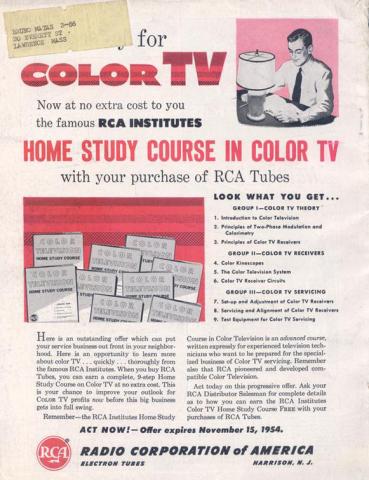
This week marks a big moment in television history - after many years of experimentation and promises, on March 25, 1954, RCA announced that it had begun producing color televisions sets out of its manufacturing plant in Bloomington, Indiana.
RCA's CT-100 featured a 15-inch screen and retailed for $1,000, making it a cheaper, though still very expensive competitor to the Westinghouse and Admiral sets that had beaten it to the market in the months previous. By November of 1954, RCA was marketing a new model, the 21-inch 21-CT-55. RCA sold each of the 3,000 21-CT-55 sets it manufactured at a loss, pricing each at 'just' $895.
This magazine advertisement, issued shortly afterwards, offered television repair and service technicians the opportunity to market to RCA's early adopters via a free 9-step home study course on color television technology, maintenance, and repair.
This item is part of Hagley Library's David Sarnoff Library digital archive (Accession AVD.2464.001) collection, a sub-collection of our David Sarnoff Library collections (Accession 2464).
David Sarnoff (1891-1971) was president of the Radio Corporation of America (RCA), one of the country’s leading manufacturers and vendors of radios, phonographs, and televisions. He established the David Sarnoff Library, to house his private papers and professional records. The collections developed further with the acquisition of papers of former RCA executives, scientists, and engineers. These collections were once the holdings of the David Sarnoff Library, which founded in 1967 as part of the David Sarnoff Research Center. When the library closed in 2009, its archival collections were donated to Hagley Library.
There are twenty sub-collections from the David Sarnoff Library. Cumulatively it includes thousands of linear feet of documents, reports, photographs, films, and publications detailing the rise and fall of the Radio Corporation of America (RCA) and of Sarnoff, its longtime leader. To view selections of material from these collections, click here to visit its page in our Digital Archives.

